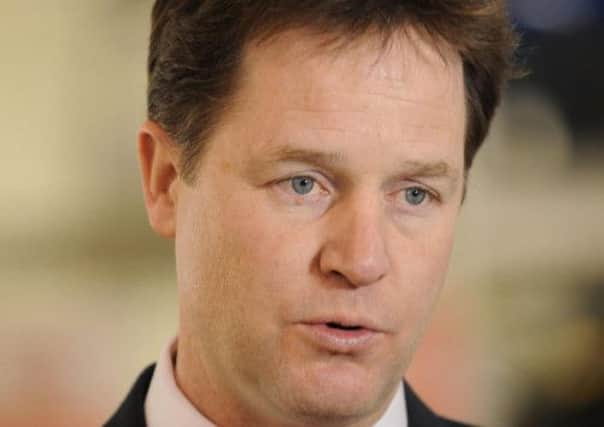Christine Jardine: Lib Dems taking high-minded road


They told me the Lib Dems would lose their deposit in Aberdeen Donside and come fifth behind a Ukip candidate who had floated in on a cloud of controversy. They were wrong. In fact as the Lib Dem candidate I came third, beat the Tories into fourth place and increased both our vote and vote share in a reduced turnout. In some parts of the constituency we did better than third.
Both our campaign and the result was positive. For me it was an important opportunity to reacquaint myself with a city that used to be home and where my family still play an important part in its civic and community life. For the party there was encouragement on the doorsteps where voters had no time for Labour or SNP.
Advertisement
Hide AdAdvertisement
Hide AdBut for me the one disappointment is that so many of the Scottish political establishment still don’t understand that politics in Aberdeen is different from the central belt. And it’s not just Aberdeen. The Highlands, Borders, Northern and Western Isles all have different issues and a different political make-up.
Scotland’s political establishment – and many of its commentariat – see all contests through the prism of the central belt power struggle between the SNP and Labour. That just doesn’t cut it in Aberdeen. Voters in the Granite City are fed up being expected to accept a diet of central belt policies.
In Aberdeen this summer that manifested itself in demands for attention to local issues, many of which are part of a bigger dissatisfaction with Holyrood’s approach to the North-east. Anger over the Haudagain roundabout and the constant hold-ups at this clashing of two major trunk roads, in the heart of the city, dominated much of the campaign.
But more than just straightforward frustration at a traffic jam it is about the perceived neglect of the city’s infrastructure in favour of bigger vote winners around Glasgow and Edinburgh. One elderly voter told me with a laugh that he was enjoying the opportunity to tell Labour and SNP canvassers what he thought and added: “I even had Alex Salmond’s deputy here yesterday and I made sure she knew exactly what I thought.” If what he told me was anything to go by I felt quite sorry for Nicola Sturgeon.
People are fed up with what they are being offered from Holyrood. Who can blame them? I took part in one radio programme that was an embarrassment – not for the production team but for us, the politicians. In more than two decades of broadcasting I have never heard such a rabble. Brian Taylor’s Big Debate was petty, it was noisy, it was horrible listening and it was enough to provoke any reasonable voter into staying at home. At one stage the Labour and SNP candidates seemed to think it was a private argument at their end of the table.
The irony for me was that it was frustration with this kind of playground bickering and blind adherence to party lines that encouraged me into politics. I had to agree with voters on the doorsteps when they expressed their disappointment in so many of those who are paid to look after their interests. Not all hustings were that bad though. By the time we did STV’s Scotland Tonight programme we had all learned how to behave ourselves.
Over the course of the five weeks, however, I became increasingly encouraged by the response to our campaign and that people were beginning to see that perhaps Lib Dems going into the coalition was paying off for them in lower taxes or higher pensions. People mostly were also not convinced about the idea of a separate Scotland.
So when it came to the count that third place, and the low turnout, were no surprise to those of us who had paid attention to what was going on. Liberal Democrats were delighted, but not entirely surprised that the percentage change in our actual votes was up 20.8. Labour was up only 2.2 while SNP was down 34.6 and the Tories 18.
Advertisement
Hide AdAdvertisement
Hide AdBut it’s what created that swing which will be the important thing for Liberal Democrats going forward. Two years ago voters were confused, sometimes angry, about how we could join a UK coalition with the Conservatives – a party in which we have little politically in common.
Perhaps their opinion was also influenced by what seemed to be less than unequivocal support for the agreement from some sections of the party. Our policies for Scotland were drowned out by the argument over Westminster. Three years on from that coalition agreement the public is beginning to see that Liberal Democrats did what they believed to be the right thing for the country.
Perhaps it is after all better than the Tories in government on their own, and Lib Dems are succeeding in getting fundamental policies on creating a fairer society enshrined in legislation over raising the tax threshold for ordinary families and increasing the state pension.
And we are campaigning hard against independence. At least one senior Cabinet minister I know likes quoting the late Russell Johnston who used to say you should always do what you believe to be the right thing. If you do that the public will recognise it and respect your decision. On the doorsteps and streets of Aberdeen that’s the feeling that was beginning to emerge.
In the melee of claim and counter-claim that politics has become, Liberal Democrats did what they believed to be the right thing. Not everyone agreed with it, or ever will, but increasingly they respect it. For Lib Dems preparing for the next round of EU, UK and Scottish elections that will be the foundation on which we build.
• Christine Jardine was the Lib Dem candidate in the recent Aberdeen Donside by-election.